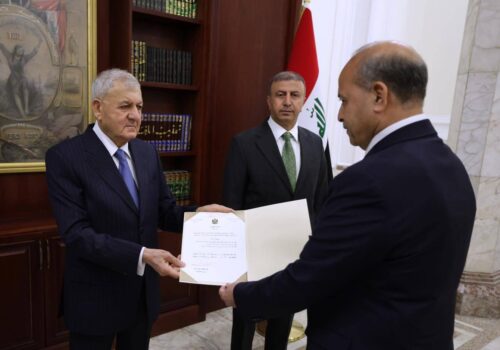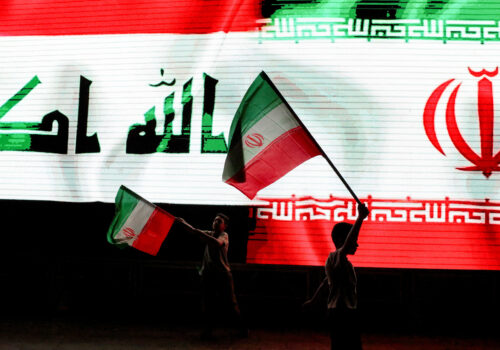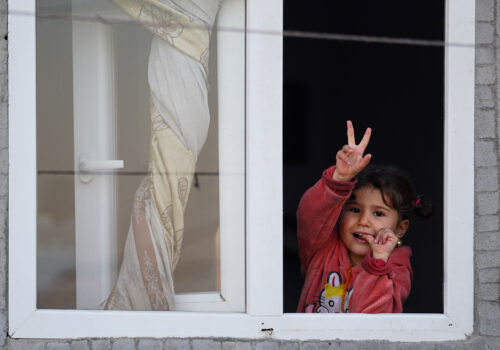An open wound, a fading light: Marking eleven years since the Yezidi genocide
The Yezidi community remains shattered eleven years since the Islamic State of Iraq and al-Sham (ISIS) launched its genocidal assault against our community in Iraq. As the Middle East continues to experience shockwaves from ongoing conflict and an evolving geopolitical landscape, the priorities of the United Nations (UN), Western states, and Iraq have shifted.
One consequence of this shifting landscape has been an erosion of international attention on Yezidi issues, despite the enduring failure to achieve a successful resolution to Yezidi suffering in the aftermath of the Yezidi Genocide. More than 2500 Yezidis remain missing, according to assessments from the Free Yezidi Foundation, and many are believed to be in Syria. While Yezidis had hoped that regime change might lead to the return of many of our missing, this has not been the case. There is still no coordinated, systematic effort to identify and rescue the missing; rather, only sporadic rescues. The window of opportunity to save the missing may be closing. Absence of justice, poor living conditions in Sinjar, lack of employment opportunities, political marginalization, and protracted displacement all continue to plague the Yezidi community.
Last year, as we marked ten years since the Yezidi Genocide, we published a comprehensive report reviewing key challenges and policy priorities. One year later, little progress has been achieved.
Sinjar
Yezidis were driven from their homeland in Sinjar by ISIS in 2014, and while a significant number of Yezidis have returned home, many have not. As of 2024, approximately 150,000 Yezidis remain in displaced persons camps in the Kurdistan Region of Iraq, according to the Hague-based International Centre for Counter-Terrorism. While the Iraqi Government has publicly pushed for the closure of internally displaced people (IDP) camps by July 2024, it seems to have reached an accommodation with the Kurdistan Regional Government (KRG) to pause the closures and slow the return process generally. Authorization letters for return do not seem to be issued, and only individuals returning through a US funded International Organization for Migration (IOM) program seem able to go back home. With limited support in Baghdad or Erbil, dwindling foreign aid, and spiking regional instability, a comprehensive voluntary, dignified return of Yezidis to Sinjar appears unlikely.
SIGN UP FOR THIS WEEK IN THE MIDEAST NEWSLETTER
The so-called Sinjar Agreement, widely promoted in Iraq and by international actors ostensibly to address instability, rebuild Sinjar, ensure security, and facilitate the return of those displaced by ISIS, has proved highly problematic due to the exclusion of the Yezidi community in shaping the agreement and its implementation. If implemented according to the current arrangement, many of the Yezidis affiliated with militias from Sinjar who joined just to defend their homeland, would be expelled, as outlined in the Sinjar Agreement. A just and logical political resolution to the current situation is required, including the demobilization and integration of Sinjar’s militia members into Iraq’s formal security architecture and empowering an elected mayor of Sinjar with meaningful decision-making authority, which would be more likely to encourage reconstruction, development, security, and ultimately, return.
Instead, Sinjar remains unstable. Its economy has collapsed, services are lacking, and most of those who returned are jobless and uncertain about the future. Despite calls for reconstruction, the Iraqi government pledged only $38 million for Sinjar and the Nineveh Plains. The Iraqi Ministry of Migration and Displacement has ceased supporting returnees, citing the lack of funds to cover the meager stipend it was providing to Sinjar returnees.
As the Kurdistan Workers’ Party (or PKK) moves to disarm, further geopolitical shifts may affect the security situation in Sinjar. Fundamentally, the Iraqi state must establish and maintain stable, predictable, legal police and security forces, ideally drawing from Yezidi and other residents of Sinjar.
National & regional geopolitics
Perhaps most importantly, Yezidis lack political weight and influence. Like other communities, Yezidis depend on a minimum level of political representation to ensure that our voices and needs are not made invisible.
Previously, Yezidis had one quota seat in Iraq’s parliament, reserved for the Yezidi electorate. In the election upcoming in November, that quota seat can be voted upon by citizens throughout Iraq, not only Yezidi voters. This means that powerful political blocs can influence the seat. We and many in the Yezidi community expect that the seat will go to a Popular Mobilization Forces (PMF) backed group. The PMF has its own political agenda and has steadily expanded its influence over Sinjar’s politics.
While Baghdad has approved mayoral appointments across most of the Nineveh governorate’s districts and subdistricts, approvals for mayorships in Yezidi-majority areas have largely stalled. While Baghdad and Erbil have continued negotiations aimed at resolving other issues like budgetary or oil and gas disputes, in Sinjar, positions remain frozen.
Further, Iraq’s parliament in January passed an Amnesty Law that may result in the release of thousands of convicted ISIS members. While Iraqi judicial proceedings are highly problematic, amnesty of ISIS members responsible for atrocity crimes is not a reasonable solution and undermines any sense of justice or fairness in Iraq from the perspective of genocide survivors.
Yezidis are also affected by Baghdad’s declining relationship with the UN. The Iraqi government’s decision to shutter the United Nations Investigative Team to Promote Accountability for Crimes Committed by Daesh/ISIS (UNITAD) has left ISIS-related evidence in a basement at UN Headquarters in New York, without a clear path toward evidence-sharing and case building against ISIS perpetrators.
Iraq seeks to wind down the mandate of the UN Assistance Mission for Iraq (UNAMI) by the end of 2025, effectively ending meaningful UN engagement in Iraq. While we have been disappointed with the UN in some respects, it was at least a regular presence ostensibly designed to promote international norms, the rule of law and accountability, and protection of all citizens, including minorities like Yezidis.
In Syria, President Ahmed al-Sharaa, the former leader of al-Qaeda offshoot Hayat Tahrir al-Sham, now leads the state—with relative support, including in the form of sanctions relief, from the United States and Europe, despite his extremist roots. The future of this new government with a Jihadist history is uncertain, but at the time of writing, the atrocities already committed against Syria’s Druze and Alawite communities are alarming for any ethnic or religious minority. Given the crimes perpetrated by ISIS, which grew strong in Syria, an extreme Islamist government in Damascus poses an existential threat to Yezidis in both Syria and Iraq.
Taken together, the developments in Iraq and the wider Middle East currently portend an ominous future for Yezidis. In our conversations with Yezidis living in IDP camps or in Sinjar, it is rare to find optimism among our people in Iraq. Almost everyone would prefer to leave Iraq and live abroad.
Policy changes in both Iraq and the wider international community, as recommended in our report last year, could help to reverse this trend. But without political strength or the active support of the international community, this is extremely difficult to envisage.
Changing US priorities
The United States has, in previous years, played a unique and irreplaceable role in Iraq. Attention to human rights, including of minority communities, the rule of law, the pursuit of justice, and combating extremism have helped Yezidis in the path to recovery, even if in small ways. The absence of a US foreign policy that prioritizes these issues presents serious threats to our communities and many others, and the US policy position regarding Yezidis is currently uncertain. Over the last decades, promotion of religious freedom and protection of religious minorities was a bipartisan US priority supported by most of the world. While the United States has the right to promote its own interests, we believe advancing fair and just societies around the world increases everyone’s security and prosperity.
Conversely, the spread of sectarian violence, Islamist extremism, and corrupt governance makes the region dramatically less safe and more difficult—resulting in costly military intervention and reducing the prospect of regional economic growth and stability.
We call on US, international, and domestic Iraqi actors to reaffirm their commitment to Yezidi recovery, to common principles of justice and fairness, and to help our community achieve dignity, safety, and a future in the Yezidi homeland.
Pari Ibrahim is the founder and executive director of the Free Yezidi Foundation. She has led efforts to amplify the voices of Yezidi survivors, promote accountability for ISIS crimes, and advance women’s empowerment.
Murad Ismael is the co-founder and president of Sinjar Academy and a co-founder of the Sinjar Crisis Management Team.
Further reading
Mon, Jul 7, 2025
Unpacking Iraq’s Federal Supreme Court chaos
MENASource By
Regardless of the reasons behind initial mass resignations, the ongoing uncertainty surrounding the Supreme Court is serious.
Mon, Jun 30, 2025
Balancing acts and breaking points: Iraq’s US-Iran dilemma
MENASource By C. Anthony Pfaff
The future of US–Iraq relations is neither as dim as it may first appear, nor as promising as one might hope.
Fri, Jun 20, 2025
On World Refugee Day, complexities persist for Syrian returnees
MENASource By Sinan Hatahet
While Syria's political shift brings new hope, it also highlights the complex realities that still define the Syrian landscape.
Image: Yezidis take part in an event at Lalish temple to mark the eighth anniversary of the Yezidi genocide carried out by the Islamic State organization in Sinjar. via Reuters


